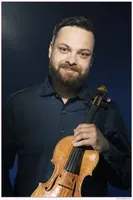
Christmas concert with Rybovka
Košice State Philharmonic
Zbyněk MÜLLER , conductor
Košice teachers' choir
Maroš POTOKÁR , choir master
Collegium Technicum
TatianaKANIŠÁKOVÁ , choir master
Adriana BANÁSOVÁ , soprano
Jarmila VANTUCHOVÁ, mezzo-soprano
Richard SAMEK , tenor
Pavel ŠVINGR , bass
Stanislav MASARYK , trumpet
Maroš POTOKÁR , violin
Barbora LENÁRTOVÁ , violin
Peter OLEJÁR, viola
Pavol ROZUM , double bass
Program:
Wolfgang Amadeus Mozart: Serenata Notturna, K. 239. 14'
Joseph Haydn: Concerto for trumpet and orchestra in E flat major Hob.VIIe:1. 15'
Jakub Jan Ryba: Czech Christmas Mass. 45'
Three-part Serenade no. 6 for orchestra in D major, entitled Serenata Notturna, was written by Wolfgang Amadeus Mozart in Salzburg in 1776. The opening movement is a majestic march, filled with a dialogue between two sections of instruments and the introduction of percussion. The minuet and trio sound without percussion, while the Rondo symbolically connects the two instrumental sections. The musical effect is charming and was appreciated even by the Salzburg audience of Mozart's time.
Joseph Haydn wrote his Trumpet Concerto in 1796 for Anton Weidinger, the inventor of the valve trumpet. Although the work was created at the end of the composer's life, it is carried in his youthful style. This applies especially to his first Allegro movement. In the middle part of the Andante, Haydn uses the chromatic possibilities of the valve trumpet in an interesting and bold way, while the final Allegro is in sonata form. In addition to the two main themes, charming side themes also come to the fore. Haydn's concerto belongs to one of the most attractive works for the trumpet in terms of interpretation and listening.
The name of the most important representative of Czech spiritual music at the turn of the 18th and 19th centuries, the composer and writer Jakub Jan Ryba, is primarily associated with his Czech Christmas Mass from 1796. This unique, purely Czech Christmas Mass ensured its creator fame not only throughout Europe, but penetrated even overseas. Ryba's musical legacy can be considered truly remarkable. Compositions with Czech text are a special and still unknown area of Ryb's spiritual work. They represent a rare proof of Ryb's efforts to use the Czech language in spiritual compositions.
